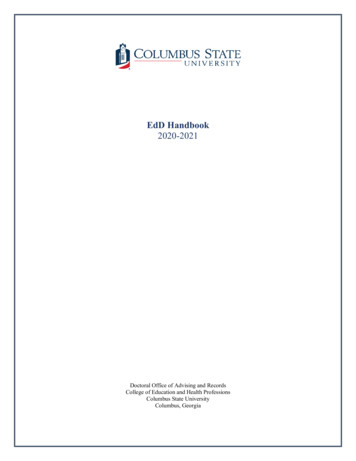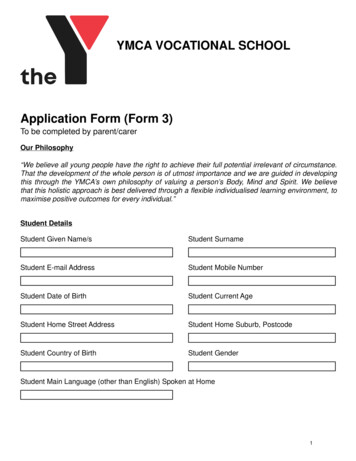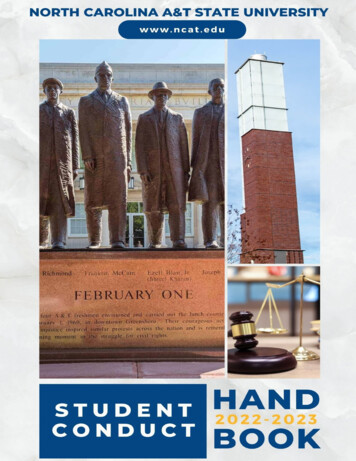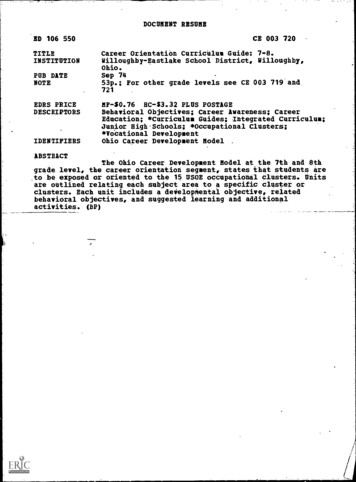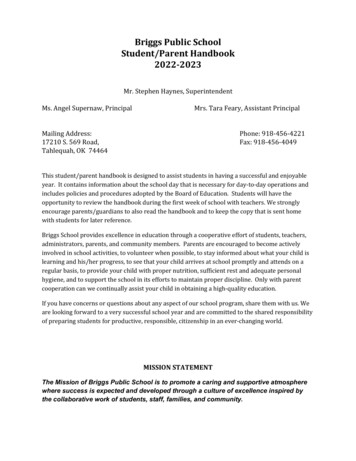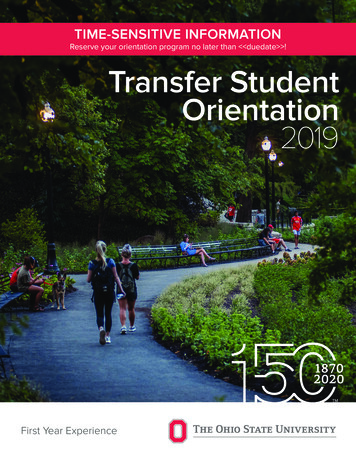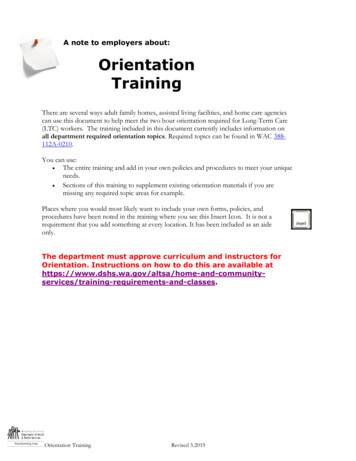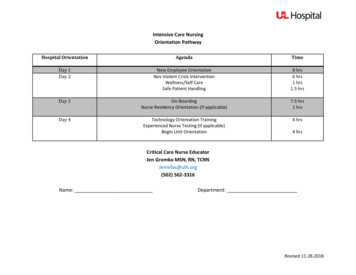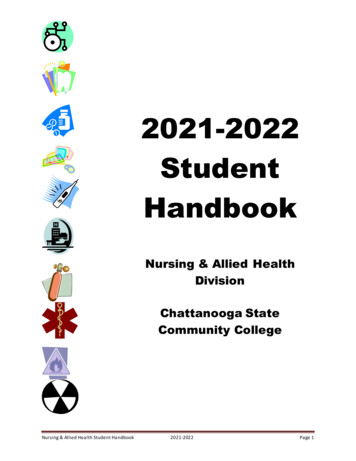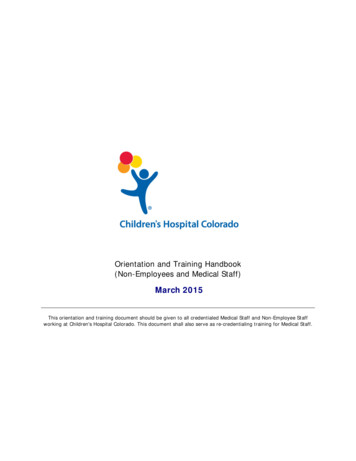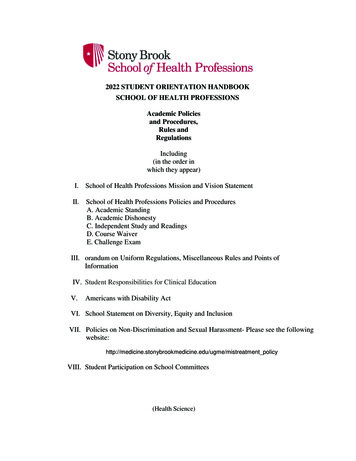
Transcription
2022 STUDENT ORIENTATION HANDBOOKSCHOOL OF HEALTH PROFESSIONSAcademic Policiesand Procedures,Rules andRegulationsIncluding(in the order inwhich they appear)I. School of Health Professions Mission and Vision StatementII.School of Health Professions Policies and ProceduresA. Academic StandingB. Academic DishonestyC. Independent Study and ReadingsD. Course WaiverE. Challenge ExamIII. orandum on Uniform Regulations, Miscellaneous Rules and Points ofInformationIV. Student Responsibilities for Clinical EducationV.Americans with Disability ActVI. School Statement on Diversity, Equity and InclusionVII. Policies on Non-Discrimination and Sexual Harassment- Please see the e.edu/ugme/mistreatment policyVIII. Student Participation on School Committees(Health Science)
Mission and Vision StatementSchool of Health ProfessionsThe mission of the School of Health Professions is to provide the highest qualityeducation in an inter-professional learning environment that fosters scholarlyactivity, including basic, translational and educational research, critical thinking,evidence-based practice, leadership, and professionalism, while affirming theimportance of ethical behavior, human diversity, equity and inclusion, cuttingedge technology, and a team approach to health care.To achieve this, the School endeavors to: Promote patient health and well-being by teaching theknowledge, behavior, and skills needed to ensure excellence inpractice; Expand knowledge and inspire ideas through research, scholarshipand creative activity; Facilitate innovative and responsible methods of managingand delivering high quality, cost-effective, accessible health care; Respond to current and emerging public health challengesboth locally and globally; Cultivate partnerships among faculty, staff, students, and community;VisionThe School of Health Professions strives to be the preferred choice for tomorrow'sinterprofessional healthcare workforce, preparing the next generation of high-qualityclinicians, while supporting basic, translational and educational research, andinnovative, inclusive teaching that anticipates andresponds to the needs of our diverse community, our region, and beyond.5.22
School of Health ProfessionsHealth Sciences CenterState University of New YorkStony Brook, New York 11794-8200Academic Policies & ProceduresPolicy No. AA002Effective 2-18-15Supersedes Pre-existing PolicyPage 1 of 11ACADEMIC STANDINGI. INTRODUCTIONA student's academic standing is subject to university standards and to thepolicies of the School of Health Professions (SHP). The Dean of the schoolshall be responsible for final decisions concerning a student's status. Astudent needs to be in good standing (p. 1) to maintain matriculation withinthe school’s programs. If the student fails to maintain good academicstanding, the student may be subject to either departmental warning (p. 2),probation (p. 2), suspension (p. 3) or termination (p. 6). Students have theright of appeal to challenge any change in academic standing (p. 7). In casesof academic dishonesty, see SHP Policy and Procedures on AcademicDishonesty.II. POLICIES AND PROCEDURESA. GOOD STANDINGA student who meets the following academic standards of the School ofHealth Professions will be considered to be in good standing:1. Undergraduate students must maintain a 2.0 minimum overallcumulative grade point average, a 2.5 minimum cumulative gradepoint average in required professional courses, and, if relevant, aminimum clinical grade point average as determined by theprogram/department.2. Graduate students must maintain a 3.0 overall grade point average.3. Students must successfully complete all program courses.4. Students must demonstrate professional performance as evidenced byadherence to professional codes of ethics, sensitivity to patient and communityneeds, patient/consumer safety and appropriate professional behavior anddemeanor. This includes the ability to work with and relate to peers and othermembers of the health care team, attitude, attendance, appearance andpunctuality. For example, students should be able to respond appropriately toconstructive criticism, recognize the impact of verbal/non-verbalcommunication, accurately self-assess and have the ability to adapt to change.
School of Health ProfessionsHealth Sciences CenterState University of New YorkStony Brook, New York 11794-8200Policy No. AA002Effective 2-18-15Supersedes Pre-existing PolicyPAGE 3 of 11AcademicPolicies & ProceduresB. DEPARTMENTAL WARNINGPolicyA student who does not meet the standards set forth in Section II.A. shall be informed ofthis in a written departmental warning by the Program Director. This warning does notimply or necessarily preclude the imposition of other penalties.Procedure1. The faculty advisors of each program will periodically review each student’sacademic record and identify students who fail to meet expectedprofessional standards of conduct and/or who are experiencing academicdifficulty. The faculty advisor will meet with the student to discuss failure tomeet program expectations/requirements.2. The Program Chair/Director may inform the student in writing of the failure tomeet program requirements and possible consequences, and inform the student ofresources available for remediation.3. The Program Chair/Director will follow up on the student’s progress andbe available for consultation.4. A student may receive any number of these departmental warnings from theProgram Chair/Director without a change in academic standing.5. A student may be placed on probation or suspended without receiving priordepartmental warnings, depending on the severity of non-compliance withII.A.C. PROBATIONPolicyA student who does not meet the standards set forth in sections II.A. 1, 2, 3 or 4, e.g., astudent who does not successfully complete all courses, maintain the minimum grade pointaverage or does not demonstrate appropriate professional behavior, may be placed onprobation. A student who has been placed on probation may not be permitted to participatein full-time clinical practice, except under extraordinary circumstances, and uponrecommendation by the Program Chair/Director to the Dean.
School of Health ProfessionsHealth Sciences CenterState University of New YorkStony Brook, New York 11794-8200Policy No. AA002Effective 2-18-15Supersedes Pre-existing PolicyPAGE 3 of 11AcademicPolicies & ProceduresProcedure1. The Program Chair/Director will review information provided by thedepartment faculty and if probation is indicated, make a timelywritten recommendation to the Dean.2. The Program Chair/Director's recommendation to the Dean may include:a.b.c.d.the reasons for such actionthe period of time for probationthe conditions for removal from probationary statusdocumentation substantiating the action.3. After receipt of the Program Chair/Director’s recommendation, the Dean shallinform the student of the decision and conditions for probation in writing withinten (10) business days of the decision. Copies of the probation letter shall beprovided to the Program Director, the Office of the Registrar, and the AcademicStanding Committee (ASC).D. SUSPENSIONPolicyA student may be immediately removed from participation in school activities by a facultymember and recommended for suspension if the student's continued participation appearsto be detrimental to the best interests of patients, peers, and/or the programmatic missionand principles of the School of Health Professions. In such cases, the ProgramChair/Director, after consultation with the faculty member, will issue a verbal directive tothe student, followed by an immediate written recommendation for suspension to theDean. Action by the Dean to determine the student's status should be taken within ten (10)business days of the verbal directive.
School of Health ProfessionsHealth Sciences CenterState University of New YorkStony Brook, New York 11794-8200Policy No. AA002Effective 2-18-15Supersedes Pre-existing PolicyPage 4 of 11Academic Policies & ProceduresProcedure1. A student may be recommended for suspension by the Program Chair/Directoron the recommendation of the program faculty any time there is an error inprofessional judgment on the part of the student that is deemed by the faculty tobe inconsistent with professional standards of care. (e.g., actions taken by thestudent that jeopardize patient safety).2. Complete documentation should be kept of any incidents leading tothe recommendation for suspension.3. The Program Chair/Director's recommendation for suspension must include, butis not limited to: a. the reasons for suspension; b. the defined period forsuspension, not to exceed one year; and c. the conditions for reinstatement.4. The Dean will decide to accept, reject, or modify the Program Chair/Director'srecommendation for suspension and inform the student of the decision in writingvia certified mail within ten (10) business days of the verbal directive.5. Copies of the action taken by the Dean will be forwarded to the ProgramChair/Director, ASC Chair, Assistant Dean for Academic and Student Affairsand the Office of the Registrar.6. Grades for courses interrupted by suspension will be determined for eachstudent on an individual basis. The options are withdrawal or incomplete.7. A suspended student will not be permitted to participate in any school activitiesor in the required periods of clinical practice. Exceptions may be made at thediscretion of the Program Chair/Director.
School of Health ProfessionsHealth Sciences CenterState University of New YorkStony Brook, New York 11794-8200Academic Policies & ProceduresPolicy No. AA002 Effective2-18-15Supersedes Pre-existing PolicyPAGE 6 of 11E. REINSTATEMENTPolicyA student who, by the end of the specified period, satisfies suspension, probationary, orleave of absence criteria imposed by the Dean may be reinstated at the end of that period.Procedure1. Reinstatement requires a memo from the Program Chair/Director to the Dean forrecommendation of reinstatement.2. The Dean will advise the student in writing within ten (10) business days ofthe change in status.3. Probation - Reinstatement after a probationary period means that thestudent returns to good academic standing.4. Suspension or Leave - Reinstatement after a suspension or leave period meansthat the student is allowed to register for courses, but may not necessarily be ingood standing. The student’s academic standing would depend on the conditionsfor reinstatement, and individual circumstances.5. The Program Chair/Director will review the student’s status to determine whetherthe conditions have been met:a. If the student has met the conditions by the end of theprobation/suspension/leave period, the Program Chair/Director mayrecommend reinstatement to the Dean, who will then inform the studentof the decision in writing within ten (10) business days of the date of thisrecommendation.b. If the student has not met the conditions for reinstatement by the end of theprobation/suspension/leave period, the student may be subject totermination.c. Probation and suspension/leave may be extended by ProgramChair/Director's recommendation to the Dean, with appropriatedocumentation to warrant continuation of the probation/suspended status.The Dean shall notify the student of the extension, the extension period, andthe conditions for reinstatement by letter within ten (10) business days of theProgram Chair/Director’s recommendation.
School of Health ProfessionsHealth Sciences CenterState University of New YorkStony Brook, New York 11794-8200Academic Policies & ProceduresPolicy No. AA002 Effective2-18-15Supersedes Pre-existing PolicyPAGE 6 of 11F. TERMINATIONPolicyA student who fails to satisfy the conditions imposed by the Dean by the end of theprobation or suspension/leave period may be subject to termination. A student whohas been informed that they are subject to termination will not be permitted toparticipate in any school activities pending any appeal process except under extenuatingcircumstances as determined by the Program Chair/Director and the Dean.Procedure1. A student may be recommended for termination by the Program Chair/Directorat the close of a probationary, suspension, or leave period if the student hasfailed to satisfy the conditions for reinstatement.2. The Program Chair/Director will inform the Dean, in writing within ten (10)business days, that the student has failed to satisfy the conditions forreinstatement and that the student is recommended for termination. Thereasons for this decision and the conditions for reinstatement that have notbeen met shall be provided to the Dean by the Program Chair/Director, alongwith supporting documentation.3. The Dean will inform the student, in writing by certified mail, that the studentis terminated, and that the termination will be stayed if the student chooses toexercise the right to appeal. If an appeal is elected, the student must submit inwriting the reason(s) for the appeal, within ten (10) business days following thestudent’s receipt of the letter from the Dean.4. If the student does not appeal the decision, the student’s status is terminatedautomatically by the Dean at close of business on the tenth (10) businessday following receipt of the Dean's certified letter.For purposes of this policy, correspondence shall be deemed “received” 5days after mailing by regular USPS mail service or, if sent by certified mailon the date of actual receipt or the date that the correspondence is returned tothe sender as undeliverable.
School of Health ProfessionsHealth Sciences CenterState University of New YorkStony Brook, New York 11794-8200Policy No. AA002Effective 2-18-15Supersedes Pre-existing PolicyPage 7 of 11Academic Policies & ProceduresG. APPEALPolicyIf the student wishes to appeal a probation, suspension or termination, the student mustdirect a letter stating the reason(s) for the appeal to the Dean. The student’s writtenstatement will explain the grounds of appeal and include any documentation supporting thereason for the appeal. The Dean may refer this to the ASC for a hearing andrecommendation. A further appeal may be directed to the Executive Vice President ofHealth Sciences, or their designee.Procedure1. If the student chooses to appeal a change in academic standing, they mustinform the Dean in writing of the intent, and reason(s) for the appeal, withinten(10) business days of receipt of the Dean's certified letter. Appeals will not begranted to those students seeking to challenge course grades, the validity ofexams/exam questions or course requirements.2. If the Dean refers the appeal to the ASC for a hearing, the student may bepresent, and bring witnesses and/or an advisor. If such is the intent, the studentmust inform the Chair of the ASC in writing no later than five (5) businessdays before the hearing, identifying the witnesses and advisor by name andtitle.3. The Chair of the ASC will create a hearing board. Hearing boards are made upof individuals on the ASC. A hearing board shall consist of a minimum of five(5) voting members of the ASC and a hearing officer. Normally the chair of theASC serves as the hearing officer, except under unusual circumstances (e.g.,illness, conflict of interest). In such a case, the Chair of the ASC will notify thealternate hearing officer. In all hearings, there will be at least one student.Neither the course instructor nor any faculty member of the department/programfrom which the student originated shall be impaneled on the hearing board.When a quorum is not available, hearing boards may be staffed by past membersof the committee. In instances where it is impossible to reach a quorum withcurrent or past committee members, ad hoc appointees will be determined by theDean.4. The ASC Chair will ask the Program Chair/Director to prepare a statementconcerning the student's request for appeal and to produce to the hearing boardall pertinent documentation and list witnesses, if any. The student has the right torequest all documentation related to the case.
School of Health ProfessionsHealth Sciences CenterState University of New YorkStony Brook, New York 11794-8200Policy No. AA002Effective 2-18-15Supersedes Pre-existing PolicyPage 8 of 11Academic Policies & Procedures5. The SHP Assistant Dean for Academic and Student Affairs or his or herdesignee, shall be available to explain policy and procedures to thestudent.6. The Associate Dean for the SHP or his/ her designee shall be available toexplain policy and procedures to any faculty involved in a hearing.7. The hearing officer will set a time for the hearing at the earliest possible dateto allow all concerned parties adequate time for preparation. Unless there areunusual circumstances, the hearing will be scheduled no sooner than five (5)business days, and no later than ten (10) business days after receipt of thestudent's written notice of intent to appeal.8. The hearing officer will open the hearing by presenting the ProgramChair/Director's written recommendation. The role of the hearing officer shall beto: (1) oversee the hearing process, (2) ensure that the policies and procedures ofthe SHP governing the process are followed and (3) ensure that the hearing movesin an orderly manner. As a member of the ASC, the hearing officer may askquestions of principals and witnesses. The hearing officer will participate in theproceedings but cast no vote, except in the case of a tie.9. The Program Chair/Director and the student may call witnesses to theappeal hearing if the testimony would prove relevant to the final decision.10. The advisor may counsel the student during the hearing but does not have theprivilege of the floor.11. After reviewing all of the evidence and interviewing any witnesses, the hearingboard will meet in executive session to review all information presented duringthe hearing and come to a decision. All decisions of the board shall be bymajority vote of the eligible members present; voting shall be by secret ballot.In case of a tie, the hearing officer will cast the deciding vote. The cast votetally will not be divulged.12 The hearing board’s written recommendation to the Dean of the SHP willbecome part of the official record. Audio recordings made during board hearingalso become part of the official record.
School of Health ProfessionsHealth Sciences CenterState University of New YorkStony Brook, New York 11794-8200Policy No. AA002Effective 2-18-15Supersedes Pre-existing PolicyPage 9 of 11Academic Policies & Procedures13. Complete records of the hearing shall be kept in the strictest confidence bythe ASC Chair. Indeed, all case-specific activities, correspondence andcommunication related to the case shall be held in strict confidence by allmembers of the hearing board at all times both during and after the appeal.Confidential records* are made available, in case of appeal and upon request, tothe designated University Official or board hearing the appeal and to thestudent(s) requesting the appeal. If the student wishes a transcript of the hearing,they are responsible for the cost of transcription. The school shall also get a copyof the transcript.* Confidential records are defined as records pertaining to the student who isseeking the appeal. This does not include records of other students.APPEAL DECISION1. The Dean of the School of Health Professions may or may not accept therecommendation of the hearing board and shall inform the student of the finaldecision in writing within ten (10) business days of the hearing date.2. Appeal Denied:a. If an appeal from termination is denied, the student’s status shall beterminated. However, the termination shall be stayed if the student wishesto pursue further appeal to the Executive Vice President of Health Sciencesor their designee.i.The appeal to the Executive Vice President of Health Sciencesshould take place within ten (10) business days of receipt of theDean’s decision, and this appeal must be based on new evidenceand/or errors in procedure. The decision of the Executive VicePresident of Health Sciences, will be final.b. If an appeal from other than termination (e.g., probation, suspension) isdenied, there shall be no further appeal and the student shall continue at thecurrent status until the conditions of probation or suspension are met.PolicyH. LEAVE OF ABSENCEA student may request a leave of absence for medical or personal reasons, but not forlonger than one year. A suspended student will not be granted a leave of absence. Astudent may not be granted more than one leave of absence for other than medicalreasons.
Policy No. AA002Effective 2-18-15Supersedes Pre-existing PolicyPAGE 11 of 11School of Health ProfessionsHealth Sciences CenterState University of New YorkStony Brook, New York 11794-8200Academic Policies & ProceduresProcedure1. A student requesting a leave of absence, either medical or personal, must do soin writing to the Program Chair/Director.2. The Program Chair/Director reviews the leave request and makes arecommendation either approving or denying the request to the Dean, supplyinga copy of the student's letter.3. The Program Chair/Director's recommendation shall include the following:a. Reason for leave.b. Length of time of the leave, not to exceed one year.c. The date by which the student must inform the Program Chair/Director andthe Dean in writing of the intent to return (usually one to two months prior tothe date of resuming studies).d. Academic standing of the student at the time of leaving and the timeof resuming studies.e. Any conditions for reinstatement.4. The Dean shall inform the student, in writing, within ten (10) business days, ofthe final decision. Copies of this letter are sent to the Office of Student Servicesand the Program Chair/Director.5. Students requesting a leave for medical reasons must also submit a physician'snote recommending leave. A physician's note indicating that the student is ableto resume studies when the leave is over shall be a condition for reinstatement.6. Leave may be extended by the student's petition to the Program Chair/Director,who will review the request and make a recommendation to the Dean, as in #3above.7. If the conditions for reinstatement are not met by the date indicated, the studentmay be subject to termination. (p. 6).8. Should there be disagreement between the student and the ProgramChair/Director concerning the arrangements for leave, the matter shall bereferred to the ASC for review and recommendation.
Policy No. AA002Effective 2-18-15Supersedes Pre-existing PolicyPAGE 11 of 11School of Health ProfessionsHealth Sciences CenterState University of New YorkStony Brook, New York 11794-8200Academic Policies & ProceduresI. WITHDRAWAL1. Authorized WithdrawalWithdrawal from the Health Sciences, for any reason, will be recorded only when thestudent requests to withdraw in writing and the Program Chair/Director supports therequest. The Program Chair/Director shall forward the request to the Dean. The date uponwhich the student requests to withdraw, and not the date of the last documented classattendance, is considered the official day of withdrawal. Non-attendance or notification tothe instructors does not constitute formal withdrawal. The student must submit the requestin writing no later than two (2) modules or ten (10) weeks after the date of the last classattended.2. Unauthorized WithdrawalA student who leaves the school without obtaining an official withdrawal shall beconsidered to have an unauthorized withdrawal and may forfeit; 1) the privilege ofhonorable dismissal, 2) the prospect of readmission and will be reported on the officialstudent transcript as having failed all courses which have not been completed.
School of Health ProfessionsHealth Sciences CenterState University of New YorkStony Brook, New York 11794-8200Academic Policies & ProceduresACADEMIC STANDING: GRADINGEvery health care professional must demonstrate, in his or her professional activity, competentclinical performance in patient care and theoretic understanding, as demonstrated by scholasticachievement.The School of Health Professions has adopted a policy on grading which is based upon thecriteria that are characteristic of a competent practitioner. The following considerations willbe included in the determination of student grades, as appropriate to the specific course beingtaken:1. Scores achieved on written tests, based upon material presented in the course and/orassigned outside readings or other learning experiences;2. Scores on oral tests, based upon material presented in the course and/or upon outsidereadings or other learning experiences;3. Assigned written reports or essays;4. Instructor’s evaluation of assigned oral presentations;5. Competent performance of laboratory procedures according to established protocols;6. Skill demonstrated in the performance of laboratory procedures;7. Competent performance of clinical procedures according to established protocols;8. Demonstrated skill in the performance of clinical procedures;9. Consistent, conscientious performance of assigned professional duties; students willrecognize the need to continue service to their patients until responsible, authorizedarrangements for continuity of the patient’s care has been arranged;10. Demonstration of equal effort and skill in dealing with all patients contacted;11. Appreciation of personal professional limitations as demonstrated by appropriaterequest for instructor assistance and the eschewing of professional tasks for whichthe student is not yet qualified. Students will carefully display and explain theirstatus to patients and professional contacts;
School of Health ProfessionsHealth Sciences CenterState University of New YorkStony Brook, New York 11794-820012. Integrity and honesty in dealings with associates, instructors, supervisors, patients,and others;13. Observance of the code of ethics for the relevant profession’s practice and thepolicies of the School of Health Professions;14. Consistent respect for the confidentiality and rights of instructors, colleaguesand patients (especially as required by HIPAA regulations);15. Fiscal integrity: Students will not accept unauthorized payment for gifts for theperformance of professional services;16. Accuracy in the maintenance of patient and professional records.Because the requirements for each course vary, the specific weight given to each of the abovecriteria may also be expected to vary in relationship to course objectives. However, it should beclearly recognized that all relevant criteria from the above list will be included to some degree inthe evaluation of student participation in each course offered by the school.Each primary course instructor has the responsibility to review these considerations for thestudents in her/his course and to list those which will be used in student evaluation in the coursesyllabus to be distributed to the students at the beginning of the course.
Policy No. AA009Effective 2-18-15Supersedes Pre-existingPolicy PAGE 7 of 8Academic Policies & ProceduresACADEMIC DISHONESTYI. INTRODUCTIONThe University Senate Academic Judiciary Committee is responsible for the establishment ofgeneral guidelines for dealing with academic dishonesty. The Academic Judiciary Committee orthe Committee on Academic Standing of the school in which the student is enrolled has theresponsibility for handling individual cases of academic dishonesty. The School of HealthProfessions has its own Academic Standing Committee (hereafter known as the ASC).Academic dishonesty includes any act which is designed to obtain fraudulently, either foroneself or for someone else, academic credit, grades, or other recognition which is not properlyearned. It is to behave, or to help another to behave, so as to improperly advance, protect, ordiminish the academic status of individuals or the University.II.EXAMPLES OF ACADEMIC DISHONESTYTypical examples of academic dishonesty include but are not limited to:A. Classroom Dishonesty1. Cheating on course or proficiency examinations by the use of books, notes, orother aids when these are not permitted, or by copying from another student.2. Submission of similar papers or projects in more than one course withoutpermission of the instructor(s).3. Collusion: Two or more students helping each other on an examination orassignment, unless specifically permitted by the instructor.4. Use of substitutes: Sitting in for another student at an examination, or permittingsomeone else to sit in for oneself.5. Plagiarism: The submission of another's work as one's own original work withoutproper acknowledgment of the source.6. Falsifying documents or records related to credit, grades, change of statusforms (e.g., adds and drops), and other academic matters.7. Altering an examination or a paper after it has been graded for the purpose offraudulently requesting a revision of the grade.
Policy No. AA009Effective 2-18-15Supersedes Pre-existingPolicy PAGE 7 of 8Academic Policies & Procedures8. Use of unauthorized materials for an exam or project (e.g., use of calculators onan exam where they have been prohibited, beepers, or other electronic devices).9. Circulation and/or use of unauthorized “old exams”.10. Unauthorized possession of an exam, even if inadvertent or un-premeditated.11. Theft, concealment, destruction, or inappropriate modification of classroom orother instructional material (e.g. posted exams, library materials, laboratorysupplies, computer programs and outputs).12. Preventing relevant material from being subjected to academic evaluation.B. Clinical DishonestyThe principles of academic dishonesty shall also apply to those courses taken during the clinicalphases of a program of instruction. In clinical programs academic dishonesty shall be definedfurther to include, but not be limited to:1. Fal
School of Health Professions Health Sciences Center State University of New York Stony Brook, New York 11794-8200 AcademicPolicies & Procedures Policy No. AA002 Effective 2 -18 15 Supersedes Pre-existing Policy PAGE 3 of 11. B. DEPARTMENTAL WARNING . Policy . A student who does not meet the standards set forth in Section II.A. shall be informed of
